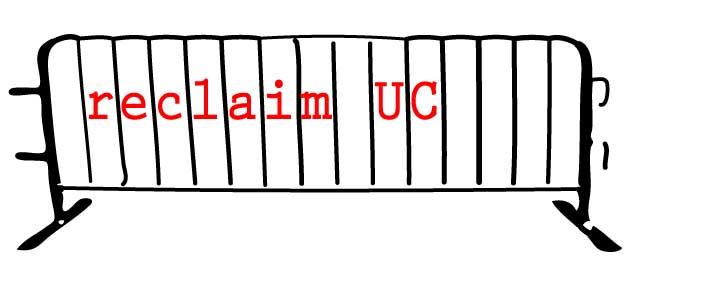For obvious reasons, the UC administration doesn't want any push back from its faculty. This is because the faculty play a key role in the administration's media strategy to defeat SB 259, according to which it's not really a question of profitability but rather one of maintaining the pleasant relationship between GSRs and the professors they work for: "extending collective bargaining rights to graduate student researchers would change the relationship between these students and their professors from an academic mentee/mentor relationship to a professional employee/employer relationship."
It appears that the administration is doubling down. What follows is an email sent yesterday by Jeff Gibeling, the Dean of Graduate Studies at UC Davis, to the Academic Senate. In it, he lays out the UC administration's case against SB 259 and "suggests" that faculty members write to the governor to voice their opposition. He also attached a document containing the administration's talking points as well as a letter from UC president Mark Yudof to Brown. Toward the end of the email, almost as an afterthought, comes the following line: "you are, of course free to express that position as well - notwithstanding that it is different from the official UC position." Of course, this brings up a series of questions about whether recommending and facilitating your employees taking a specific position of a piece of public legislation is legal, and what constitutes implicit coercion. At the very least, it reveals just how desperate the administration is.
From: "Gibeling, Jeffery"
Subject: Legislation Affecting Graduate Student Researchers
Date: September 7, 2012 11:05:42 AM PDT
To: "academic-senate@ucdavis.edu"
Dear Academic Senate Colleagues
In the past, the Public Employment Relations Board has interpreted state law in such a way that Graduate Student Researchers were deemed to be students rather than employees, hence ineligible to be represented under a collective bargaining agreement. Recently, legislation that would extend collective bargaining rights to GSRs (SB 259) has moved through the legislative process. It has passed through the State Senate and the State Assembly and has been forwarded to Governor Brown. He has 12 days from last Wednesday to act on the legislation (sign or veto). The text of the bill is available at http://leginfo.legislature.ca.gov/faces/billNavClient.xhtml?bill_id=201120120SB259&search_keywords=).
The University administration has officially taken a stand in opposition to the bill as described in the attached talking points and letter from President Yudof to the Governor. Last year, the systemwide Academic Senate also took a position to oppose this bill (http://www.universityofcalifornia.edu/senate/AcademicSenPositiononSB259_REVISED_050411.pdf).
Some of the concerns are that under a collective bargaining agreement, compensation for GSR’s could be forced to be the same across all disciplines and all campuses. This change would impact our ability to offer competitive stipends that vary by discipline. A collective bargaining agreement might potentially result in fewer UC graduate researchers being hired due to the additional requirements that will likely be imposed as part of a union contract. Moreover, a union contract may seek limits on working hours during a given period, preventing well-intentioned graduate students from pursuing their research and degree objectives as they see fit. The costs associated with implementing the collective bargaining process will also draw away from UC campuses some resources that could otherwise be devoted to providing direct services to students. While I agree that the cost and workload issues are important, my greatest concern is the potentially damaging effect that this change in relationship between graduate students and their faculty mentors may have on our graduate students and our programs.
I anticipate that some faculty will have concerns about this legislation. If you wish to express your opposition, you may want to visit the website:
http://www.ucforcalifornia.org/uc4ca/home/opposeSB259 and consider sending an email or making a phone call to Governor Jerry Brown and asking him to veto SB 259. I also recognize that some faculty colleagues may support this legislation, and you are, of course free to express that position as well - notwithstanding that it is different from the official UC position. Following is the contact information for the Governor and key advisors on this matter:
· Governor Brown: (916) 445-2841
· Nancy McFadden: Executive Secretary to the Governor: (916) 445-2841, nancy.mcfadden@gov.ca.gov
· David Lanier, Chief Deputy Legislative Secretary, Office of the Governor: (916) 445-4341, david.lanier@gov.ca.gov
· Marty Morgenstern, Secretary of Labor & Workforce Development: (916) 327-9064, marty.morgenstern@labor.ca.gov
If you have an opinion on this matter, you may wish to make your views known to the Governor.
Sincerely,
Jeff Gibeling
Jeffery C. Gibeling
Dean--Graduate Studies
University of California, Davis
One Shields Avenue
Davis, CA 95616
phone: (530) 752-2050
FAX: (530) 752-6222













